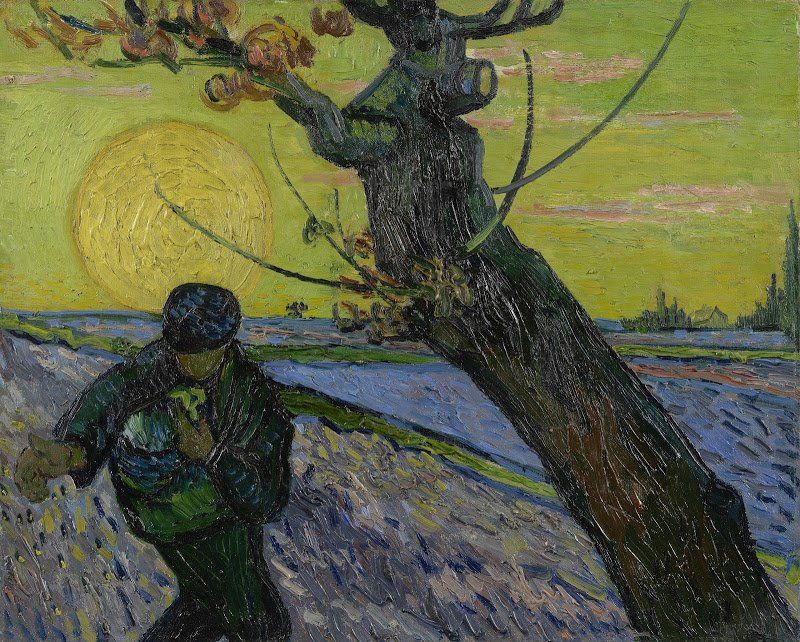The Sower: A parable for a time such as this
Our responses to God in a Covid-19 world.

We are currently in Year A of the Church of England lectionary and a time which some call ‘parable season’ when we are encouraged to dwell on the well-known parables that are recorded in Matthew Chapter 13.
Parables form nearly a third of Jesus’s teaching, and he used these stories to help bring seemingly abstract and often complex concepts such as justice and mercy near for people using imagery that was familiar from their daily lives. Parables are literally ‘para’ near ‘ballo’ bringers – ‘near bringers’.
Today’s reading ( Matthew 13:1-9, 18-23) focuses on Jesus’s use of the familiar image of a farmer sowing seed to help explain some of the complexity of our human nature. In this parable, the sower is faced with the extraordinary challenges of sowing on less than fertile ground. We are told that some seeds he sowed fell on the path, others on rocky ground and some among thorn and weeds – with only a portion of the seed falling on good soil.
Now no-one who knew the first thing about farming would actually sow with such abandon, scattering precious seed far and wide on highways and byways. And not surprisingly the sower had mixed results. The seed that fell on the path was eaten up.That which fell on rocky ground with little soil, sprung up quickly but was soon scorched by the sun and withered away, while other seed was choked by thorns and weeds. Only the seed that fell on good soil went on to produce a harvest.
When his baffled disciples questioned him on the meaning of this tale, Jesus went on to explain that the different ground conditions in his parable are a metaphor for how people hear and respond to his word.
When we hear but do not understand, the good news is snatched away like birds snatching seed from a path. Some are initially elated to hear God’s words but like the seed on rocky ground their faith has no roots and withers away when trouble or persecution comes. Others’ faith is choked out of them by the weeds and thorns of the cares of the world. It is only when when Gods’ word falls on the good soil of understanding it produces a wonderous harvest.
I am sure we would all like to think of ourselves as good soil where God’s word takes root and flourishes, but we all contain within ourselves to the ability to be any of these different forms of ground. Within all of us lies the potential for God’s word for blossom and transform, but also for belief to rise up but then die away as the concerns of the world overtake us. And at different times of our lives we may respond to God’s word in different ways. This is the reality of living as flawed ‘sinful’ human beings in a broken world.
We live in a world fractured by our own disobedience and rebellion. And God told Adam that as a result of mankind’s failure to obey God that our efforts would be frustrated by ‘thorns and thistles’ brought forth from the earth. That having fractured our relationship with our creator, life on earth would be hard.
Over the past few months we have been provided with a brutal reminder of that reality. Most of us alive today have come to believe in the inevitability and power of human progress but the coronavirus that has swept across the world taking lives and security has challenged people at a very deep level.
Covid-19 has affected us all and as our sense of normality has been threatened, many have found themselves seeking meaning in new ways. The thorns and weeds of this terrible pandemic has caused people of different faiths and none to question anew how such things can happen.
Sadly some people’s belief has been choked out of them by the cares of this time, as they struggle to find God in the midst of the pandemic. But for many this crisis has led to a re-evaluation of their secular world view and a reconnection with God - evidenced by the enormous increase in people who say that they have been praying and those who have been attending church for the first time online.
The great writer and thinker C.S. Lewis described our pain as the megaphone that God sometimes uses to rouse a deaf world. I am not suggesting that God created Covid-19 but rather than he can use our experiences of living in this world we have fractured by pointing us back to him, our creator.
God does not only sow his seed in good soil. He loves us with such abandon that he scatters that love far and wide. He does not want to miss the chance of reaching even one lost soul. And in these times, the thorns and weeds, may be the very thing that brings us back to a deeper relationship with God.
Kate Nicholas’s best-selling memoir Sea Changed (shortlisted as Christian Biography of the Year 2017) and her latest book Sea Changed: A Companion Guide – Living a Transformed Life are available at Christian bookstores and online at eden.co.uk, kooroong.com and Amazon worldwide. Her TV series Living a Transformed Life can be viewed on demand on www.tbnuk.org or at www.katenicholas.co.uk Kate’s next book Soul’s Scribe: Connecting your Story and God’s Narrative will be available in early 2020.
Image: Vincent van Gogh 'The Sower' courtesy of The Van Goth Museum, Amsterdam.
.
